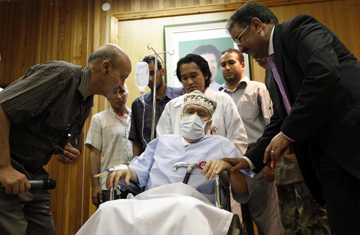
Abdel Basset Ali al-Megrahi sits in a wheelchair in his hospital room in Tripoli on Sept. 9, 2009
With questions raging over whether BP lobbied to have the convicted Lockerbie bomber freed from a Scottish jail, a senior Libyan official involved in the negotiations with Britain at the time denies that the company secured its $900 million oil contract as part of a deal regarding Abdel Basset Ali al-Megrahi's release from prison. Al-Megrahi was serving time for bringing down Pan Am Flight 103 over the Scottish town of Lockerbie in December 1988, killing 270 people. "The release of Megrahi has nothing to do with the negotiations about BP contracts," Abdul Ati al-Obeidi, Libya's Minister for Europe, tells TIME, denying the charges made by some U.S. Senators that Britain maneuvered to have al-Megrahi released in order to secure lucrative business for British companies — especially BP. "The agreement [with Britain] was not used to release him," he says. "It was never discussed with BP."
In a Washington press conference after his meeting with U.S. President Barack Obama, British Prime Minister David Cameron said BP did not attempt to sway talks between Libya and Britain to benefit its corporate oil interests. He reiterated that it was the Scottish national government that decided to release al-Megrahi and that he believed the decision was a mistake.
All the details of those talks are likely to be probed in a Senate Foreign Relations Committee hearing into al-Megrahi's release on July 29. BP admitted last Thursday, July 15, that it had told British officials in late 2007 that a stalled prisoner-transfer agreement between Britain and Libya "could have a negative impact" on BP's oil deal in Libya, but the company denied pushing specifically for al-Megrahi's release. And while Libya might not have discussed al-Megrahi's freedom directly with BP, as al-Obeidi claims, there is evidence that BP's good fortunes in Libya might not have happened had al-Megrahi remained in jail.
Libya watchers say the Lockerbie bomber's continued imprisonment hugely complicated Britain's business prospects in Libya and might have torpedoed them had al-Megrahi died in jail in Scotland; at the time of his release, last Aug. 20, al-Megrahi had served eight years of a life sentence. British and Scottish officials have insisted that al-Megrahi was freed solely on compassionate grounds after a doctor declared that he would probably die from cancer within three months. Libya experts are skeptical, saying the business stakes were high. "If Megrahi died in jail in Scotland, there would have been high tension, and Libya might have frozen British contracts," says Guma El-Gamaty, a Libyan political writer in London. "Megrahi was a very, very emotive issue for Libya." Richard Dalton, Britain's former ambassador to Libya, says British companies were aware that they might be punished if al-Megrahi did not return home. "BP and other business interests knew perfectly well that if the Libyans did not get satisfaction on the four deals they'd agreed on with [former British Prime Minister Tony] Blair, there would be commercial consequences," he says. "That is the way the Libyans operate."
The four agreements were enshrined in a "deal in the desert" between Blair and Libyan leader Colonel Muammar Gaddafi in May 2007; they involved civil and legal cooperation agreements, an extradition treaty and a prisoner-transfer deal. Underscoring how important BP was to the new friendship, Blair then traveled to the Libyan city of Sirte to witness the signing ceremony between BP chief executive Tony Hayward and Libyan oil minister Shukri Ghanem. Their contract was for an oil-exploration deal worth about $900 million in the Libyan Sahara and offshore.
But Libya delayed ratifying BP's contract, as Britain pushed to exclude al-Megrahi from the prisoner-transfer agreement. In an interview in Tripoli last February, Gaddafi's son Saif al-Islam Gaddafi, who led the negotiations to free al-Megrahi and escorted him home, told me Libyan officials were furious at the British efforts to block al-Megrahi's release. Gaddafi's son said Libya refused to bend to several British requests that al-Megrahi be named in the agreement as the sole prisoner who would not be eligible for possible release. "We refused," he said, adding that he told the British that "this is not normal practice, that we will not mention any specific example in a government-to-government agreement." Faced with Libya's insistence that al-Megrahi should be eligible to leave prison, Britain apparently then dropped its efforts to block his release, citing "overwhelming interests of the United Kingdom," explained Jack Straw, Britain's Justice Secretary at the time, in a letter to Scotland's top justice official that was leaked to Britain's Sunday Times last August. Six weeks later, Libya formally ratified BP's contract.
While the timing might have been coincidental, Saif al-Islam Gaddafi said on Libyan television after al-Megrahi's homecoming that "in all commercial contracts for oil and gas with Britain, he was always on the negotiating table." BP's exploration in Libya is now under way. But that, says al-Obeidi, has nothing to do with al-Megrahi's release. "Megrahi was released because he was very sick and the disease was spreading all over his body. That is the story in brief," he says.
The al-Megrahi affair had been all but forgotten in Washington and London — where a new government is in power — until the British doctor who had declared al-Megrahi on the verge of death last year told a British newspaper early this month that he had not been certain of that at the time. With widespread public anger over BP's handling of the oil spill in the Gulf of Mexico, the Senate Foreign Relations Committee says it will call BP officials to testify next week about al-Megrahi. Eleven months after his release, al-Megrahi is still alive, at home in a Tripoli suburb, living under police protection in a sprawling yellow house that was built for him shortly before his release.
